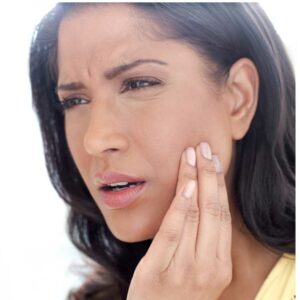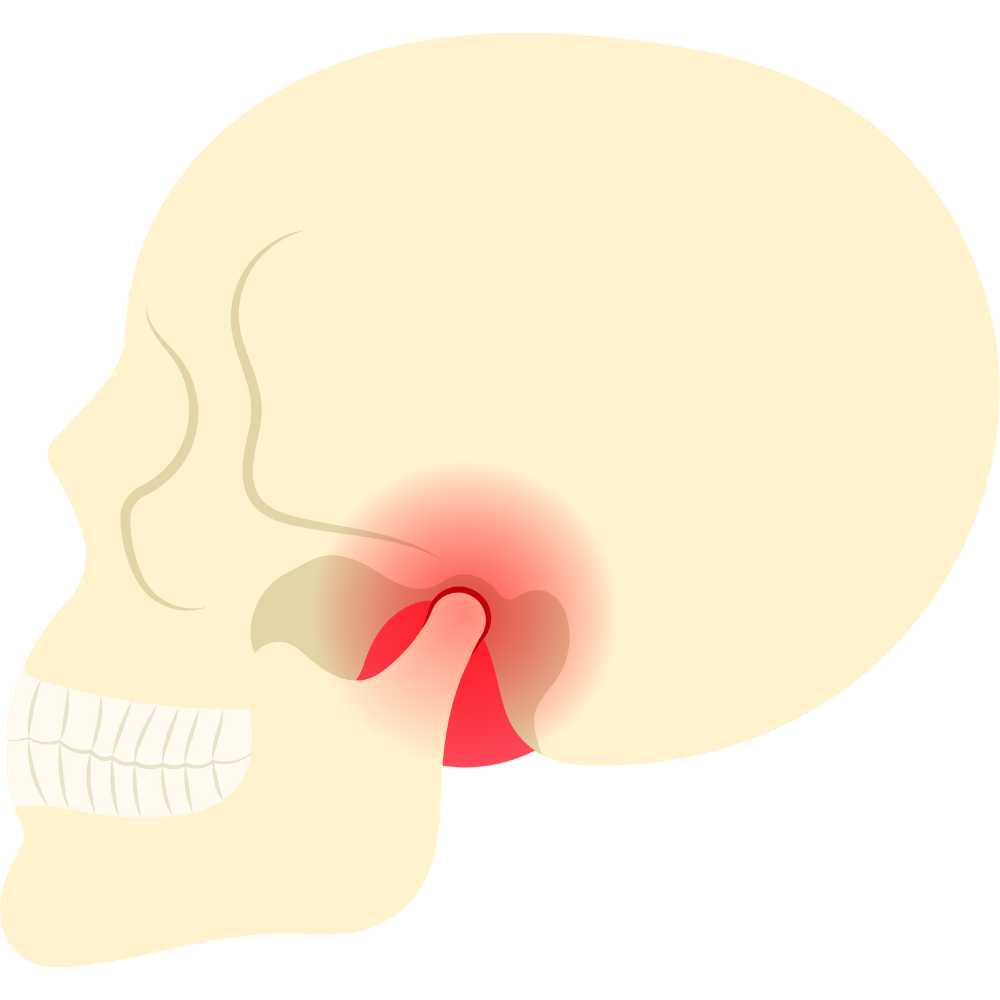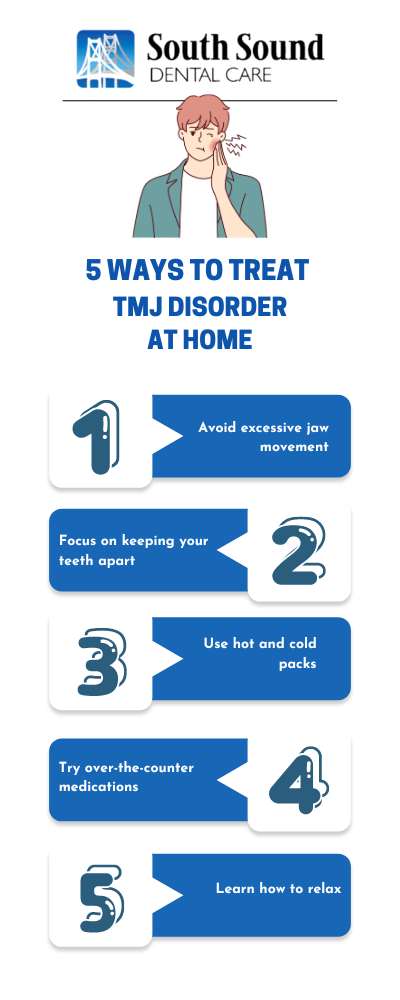Effective TMJ and TMD Treatment in Tacoma, WA
At South Sound Dental, we simplify the complexities of TMJ (Temporomandibular Joint) issues, offering valuable insights into their root causes and effective remedies. Our goal is to empower you with knowledge, paving the way for potential relief from the discomfort associated with TMJ-related jaw pain
What is TMJ?
TMJ stands for temporomandibular (pronounced tem-puh-roe-mun-DIB-u-lur) joint. It is the hinge that connects your jawbone to your skull. When someone has a TMJ disorder (TMD), they will often experience pain in their jaw and with the muscles that control jaw movement.
What causes TMJ?
It’s not exactly known what causes TMD. It may be the result of an injury to the jaw or head such as a heavy hit or whiplash. Other causes include:
- Grinding and clenching your teeth
- Arthritis in the joint
- Stress often causes the tendency to tighten facial and jaw muscles (clenching your teeth).
The pain associated with TMJ disorders may be temporary or last years. Women are more likely to get it than men and it’s most common among people between 20 and 40.


Common symptoms of TMJ Disorder
-
Pain in your face, jaw, and neck
-
Problems opening your mouth wide
-
Your jaw getting stuck in the open or closed position
-
Trouble chewing
-
An uncomfortable change in your bite
-
Clicking, popping, or grating in the jaw joint
If you or someone in your family is experiencing these symptoms, call us for an appointment. We will get you in right away for a consultation with Dr. Khan.
The Link Between Posture and Oral Health
Some seemingly unrelated things are often connected which is a big reason we hear so much emphasis on holistic medicine. We’ve discussed how a persistent headache could be linked to tooth decay when it has reached the point of needing immediate attention. If you experience frequent headaches along with pain in your lower jaw it is very likely that it could be linked to bad posture. You’ll want to consult with the dentist about temporomandibular disorder (TMD) also known as TMJ disorder. When you have bad posture, your spine is placed in a position that puts stress on your jaw joint. When slouching, your lower jaw shifts forward which causes your upper and lower teeth to not meet up properly and your skull moves back on the spine. This movement is stressful for bones, joints, and muscles and causes inflammation.
We know that posture is important for our health for many reasons including that it:
- Helps us breathe properly
- Increases our concentration and thinking ability
- Improves self-confidence and image
- Helps us avoid health complications such as back aches and poor blood circulation
And now we also know that it helps us with maintaining good oral health as well. If you experience facial pain and/or persistent headaches and you are guilty of bad posture consult the dentist about treating what could likely be a temporomandibular disorder (TMD).
5 Ways to Treat Your TMJ Disorder at Home
You’ll want to talk to the dentist about your temporomandibular joint disorder (TMJ or TMD) and the best course of action for treatment. That discussion may include one or more of these at-home options. Eat soft foods. It is probably a good idea to avoid hard, crunchy, or chewy foods and/or foods that require you to open your jaw wide to consume them. Eating soft foods such as mashed potatoes, soup, cottage cheese, and scrambled eggs is a much better option requiring minimal chewing.
1. Avoid excessive jaw movement
Along with avoiding too much chewing or chewing too hard, avoid chewing gum or anything else like yelling or singing that forces a lot of movement, especially with a wide-open jaw.
2. Focus on keeping your teeth apart
Try to keep your teeth slightly apart, when possible, thus relieving pressure on your jaw. You can try putting your tongue between your teeth to prevent clenching and grinding.
3. Use hot and cold packs
Apply an ice pack to the side of your face for about 10 minutes followed by a warm towel or cloth for about 5 minutes. Ask your dentist about possible jaw stretches between the cold and hot packs.
4. Try over-the-counter medications
NSAIDs like naproxen or ibuprofen can help with relieving the pain and swelling.
5. Learn how to relax
Talk to the dentist about physical therapy, massage, and/or stress reduction therapy.

How can South Sound Dental Care Help With TMJ Pain Management?
South Sound Dental Care can help you manage your TMJ through crafting custom mouth guards tailored specifically for TMJ patients.
These personalized guards provide optimal support, alleviating discomfort and helping to restore your jaw’s natural function, so you can enjoy a pain-free life.
There are several types of mouth guards for TMJ, including:
1. Custom-fitted mouth guards: These are made by a dentist or orthodontist and are designed to fit your teeth and jaw specifically. They can be more expensive but are often the most effective.
2. Boil-and-bite mouth guards: These are available over the counter and can be molded to fit your teeth by boiling them in water and then biting down on them. They are less expensive than custom-fitted mouthguards but may not be as effective.
3. Night guards: These are designed to be worn while sleeping and can help prevent teeth grinding and clenching, which can exacerbate TMJ symptoms.
What is the Best Mouth Guard for TMJ?
It’s best to consult with a dentist or healthcare professional to determine which type of mouth guard is best for your specific needs.
Do I Really Need a Mouth Guard or a Night Guard?
Your dentist might recommend that you use a night guard while you’re sleeping. If you have an issue with grinding your teeth or clenching during the day a mouth guard may be necessary during the day too. Many people that grind or clench (called bruxism) have no idea that they are even doing it, but it can be very detrimental to your teeth. Wearing a night guard, of course, sounds undesirable, but what is more undesirable is the effects bruxism will have on your teeth.
Clenching and grinding teeth can cause:
-
Broken teeth
-
Periodontal issues
-
Sore jaw or TMJ
-
Headaches
-
Receding gums
-
Temperature sensitivity
There is no cure for bruxism, but wearing a night guard will go a long way in reducing the wear and tear bruxism causes. A night guard can also prevent more dental work that will be needed if one is not used.
Your dentist will take impressions of your teeth to have a dental lab make a night guard that will be an exact match for your teeth. Your night guard will most likely cost a few hundred dollars but it’s an investment that will pay off in the long run. Most dental insurance will cover all or part of the cost.
The main key to the night guard, but, is actually using it! Of course, it’ll take some getting used to and you won’t like it at first, but we’re talking about your smile so make sure you use it instead of letting it collect dust on your nightstand.
If you’ve been told that you might want to consider a night guard or if you think that clenching and grinding is an issue for you, call us for a consultation.
Find out more about TMJ treatment and TMJ therapy
Give us a call today for a free TMJ consultation at 253-473-4303.

